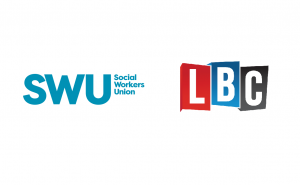SWU Blog: “Unmanageable” social work caseloads putting vulnerable at risk

The Social Workers Union (SWU) conducted a survey of its members in January 2022 in conjunction with LBC Radio to highlight the pressures facing staff in social work and the changes that may be needed to address them. Almost 1000 of you responded and shared some powerful stories with us about your experiences and the pressures of social work.
Almost two-thirds 58% of social workers say their caseloads are unmanageable.
With almost all social workers (97%) saying that the vulnerable would be better protected if case loads were lighter, SWU has called for urgent action to better support front-line social workers.
In the last 18 months almost half (48%) of social workers have raised concerns about cases where they don't believe appropriate action was taken. Of these, 29% have highlighted more than 5 cases in that time.
In addition, most social workers expected to see referrals increase over the next 12 months (94%), with 71% expecting to be inundated.
But increasing case loads are pushing social workers to the brink. Eight out of ten (82%) social workers suffer from stress at work with two-thirds (65%) saying that their mental health is suffering because of their job.
A quarter (24%) admitted to finding themselves suffering an emotional response to their work (crying / feeling unwell) at least once a week. Resulting in half of social workers considering leaving their posts.
John McGowan, General Secretary of the Social Workers Union, commented:
“This recent member survey has highlighted what the reality of being a social worker in 2022 is and reflects the pressures our members are presently under.
“It is a great concern that half of social workers are considering leaving the profession due to the pressures of the work and the impact the work is having on their mental health.
“Social work intervention can greatly improve the quality of life and opportunities for the children, families, adults and communities we support 24/7. However, it is fair to say that unless the pressures we are under are addressed we will not be able to reach the very people who need our service and support.”
A collection of social workers' responses to SWU's survey:
A child protection worker in the West Midlands told LBC Radio she’s been responsible for 50 children at once, even though the safe cap should be between 15-25. She said:
"It got to the point where I felt like I was a walking zombie.
"I wasn’t sleeping, and I was just getting on with the long days the next day. I became physically unwell and had to take some time off work. I came back and things were still crazy, and I had to be signed off by my doctor.
"But the worry comes in - it’s children, you want to see them. You have to find a way to manage it, but it’s so difficult. I’ve had countless worried sleepless nights, it’s never ending."
A child protection worker, who has been visiting vulnerable children for three and a half years, told LBC Radio:
"Your case load, the majority of the time, is a lot higher than it should be.
"My cap is 15-20 cases [children] at one time, but it has been a lot more. More experienced social workers have a cap of 25, but I’ve known them to be on 35. You have to visit them, make sure they’re safe, complete risk assessments, and then within that things happen unexpectedly which delays the work even further.
"We will say it’s not safe, but where do they go? Where else are these children going to go? Someone needs to have them."
Another children’s social worker, who wished to remain anonymous, said:
"Raising concerns about the lack of action on cases is the norm.
"However, with a lack of resources, it is difficult to take the right action at the right time. Managers hear and listen to us, but it's the way the system is, and we have had to learn to accept it."
One social worker told researchers:
"Working long hours takes its toll on self and my own family life. Recent media coverage puts the onus on social workers failing and blaming people who often make a positive difference in many children’s lives.”
While another social worker wrote in answer to the survey:
"Raising concerns about the lack of action on cases is the norm, however with lack of resources it is difficult to take the right action at the right time sometimes. Managers here listen to us but it's the way the system is and we have had to learn to accept it most of the time."
Another social worker added:
"We need more staff to bring caseloads down. Stop expecting us to work late and work over our hours. A 60 hour week when you are paid for only 35 means we are practically on minimum wage. We need to be looked after by the services we work for. Our job is unsafe and unhealthy."